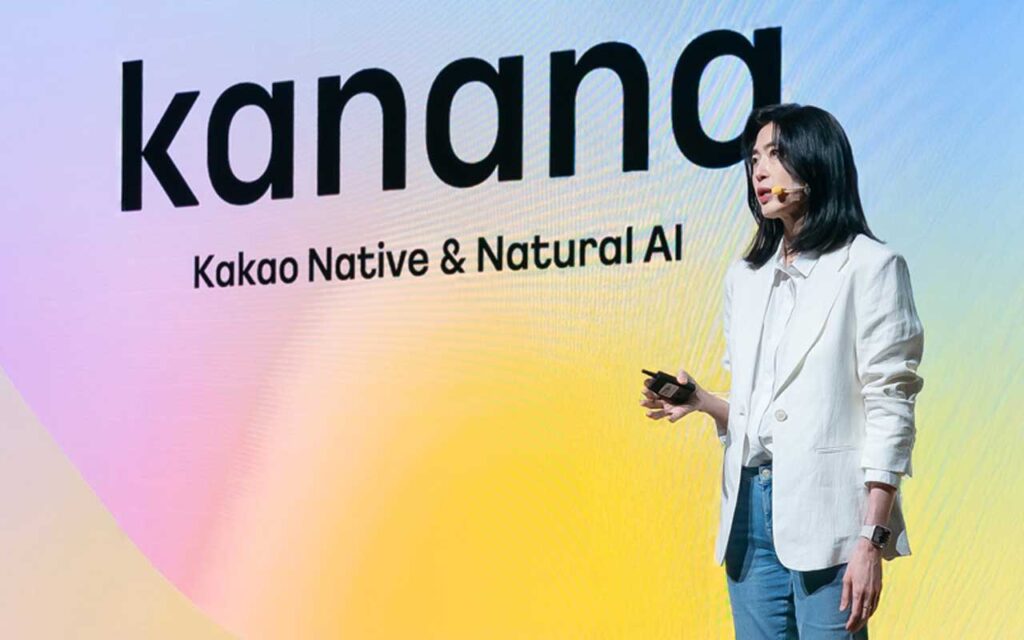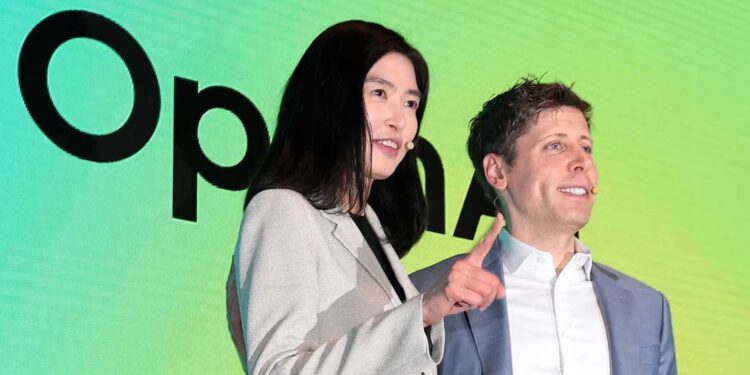Kakao is advancing its position in Korea’s artificial intelligence ecosystem through a landmark collaboration with OpenAI, unveiling Kanana AI with ChatGPT integration and deep AI integration into KakaoTalk. Framed against the backdrop of the Korean sovereign AI initiative, the strategy merges OpenAI’s global AI capabilities with Kakao’s domestic platform dominance to capture first-mover advantage in the nation’s fast-evolving B2C AI market, as AI competition among Korea’s big tech players enters full swing.
Kakao and OpenAI to Launch Kanana AI This Fall
The co-developed service will debut at Kakao’s “If Kakao” developer conference in September, with public rollout planned before the company’s third-quarter earnings announcement.
According to Kakao CEO Jeong Shin-ah, the product will integrate ChatGPT’s core capabilities with Kakao’s proprietary assets — including domestic user behavior patterns and preferences derived from KakaoTalk — to create a Kakao and ChatGPT integration tailored for Korean users.
“We are preparing at full speed to deliver an AI service that everyone in Korea can easily access and benefit from,” CEO Jeong Shin-ah told investors during the company’s Q2 earnings call.

Kanana AI to Anchor Kakao’s Broader AI Strategy
Starting in October, Kakao will sequentially launch AI-powered services under the Kanana AI brand, encompassing its full AI stack: infrastructure, proprietary language models, middle-layer MCP, AI agents, and consumer-facing B2C services.
The OpenAI collaboration will serve as a flagship offering within this ecosystem, complementing Kakao’s independent AI initiatives.
CEO Jeong Shin-ah emphasized that the second half of 2025 marks a shift from AI model development to large-scale service deployment, with the company aiming to replicate its mobile-era dominance in the emerging AI agent era.
Kanana AI: KakaoTalk AI Integration with On-Device Models
A central component of the rollout is the AI integration in KakaoTalk, embedding Kanana AI directly into Korea’s most widely used messaging platform.
Rather than functioning as a standalone service, Kanana AI will operate as a “middle layer” across KakaoTalk’s various spaces, providing context-aware recommendations, executing user-intended actions, and eventually completing tasks entirely within the chat interface.
This integration will be powered by Kakao’s proprietary lightweight on-device AI model — the first such deployment in Korea outside select device manufacturers. The approach is designed to enhance privacy, reduce inference costs, and build operational experience ahead of wider public adoption.
Building an AI Agent-Centric Ecosystem
Kakao is also developing an AI agent platform ecosystem to mirror the dominance it achieved in the mobile era.
At launch, selected Kakao services will be linked to AI agents, with expansion planned to include third-party verticals through both Kakao Group companies and external partners.
The company’s strategy reflects a broader market shift from app-centric usage to agentic AI, where protocols like MCP and agent-to-agent communication allow users to complete goals without opening multiple apps.
CEO Jeong Shin-ah asserts that combining Kakao’s agent-specialized models with KakaoTalk’s messaging protocol capabilities will create the strongest platform in Korea’s agentic AI landscape.
Position on the Korean Sovereign AI Project
Kakao’s AI expansion follows its exclusion from the government-led sovereign AI foundation model project.
Some industry observers suggested the decision may have been influenced by Kakao’s declared OpenAI partnership, potentially conflicting with the project’s selection criteria.
CEO Jeong Shin-ah maintains that Kakao’s strategy aligns with the Korean sovereign AI vision, focusing on delivering accessible, service-oriented AI rather than solely building base models. The company is investing in high-performance SLMs, multi-model architectures, and Mixture-of-Experts (MoE) frameworks optimized for AI agent services.
“Our goal is to integrate advanced AI into daily life, creating an ‘AI-first society’ while strengthening Korea’s AI ecosystem and technological sovereignty,” Jeong said, adding that Kakao’s approach is designed to drive rapid user adoption and strengthen user lock-in in the domestic market.
Avoiding Cannibalization with ChatGPT
Addressing concerns that the Kakao–OpenAI joint service could cannibalize ChatGPT’s standalone product, Jeong explained that the two offerings target different user segments. Web users may seek in-depth research capabilities, while mobile users often prefer quick, conversational interactions.
Kakao anticipates mutual user growth potential, with even AI novices encountering ChatGPT-powered results in KakaoTalk chats or key app interfaces. This “trickle-in effect” is expected to naturally spark curiosity and adoption. The service’s UI/UX is being designed for ease of use, encouraging first-time AI engagement to become a daily habit.
Competitive and Ecosystem Implications
By embedding AI into KakaoTalk, rebranding under Kanana AI, and aligning with sovereign AI priorities, Kakao is positioning itself as both a commercial leader and a strategic contributor to Korea’s AI competitiveness.
And the timing is significant. With Naver advancing its Clova X conversational AI and domestic startups pursuing sovereign AI mandates, Kakao’s combination of global partnership, proprietary technology, and platform reach could redefine the competitive landscape in Korea’s B2C AI sector.
– Stay Ahead in Korea’s Startup Scene –
Get real-time insights, funding updates, and policy shifts shaping Korea’s innovation ecosystem.
➡️ Follow KoreaTechDesk on LinkedIn, X (Twitter), Threads, Bluesky, Telegram, Facebook, and WhatsApp Channel.






